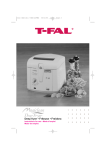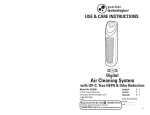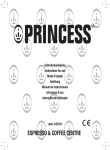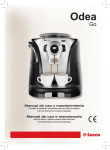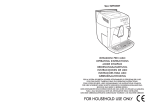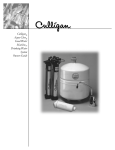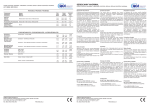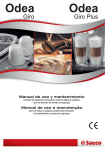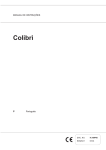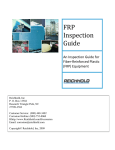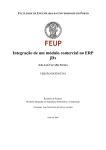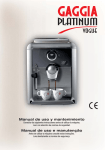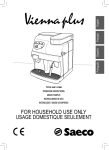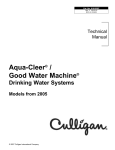Download Manual Técnico
Transcript
INSTRUCÇOES E MODO DE EMPREGO OPERATING INSTRUCTIONS SYNCRONY COMPACT Parabéns! Obrigado por ter adquirido esta máquina de café expresso de qualidade superior e pela confiança demonstrada. Antes de utilizar a máquina é aconselhável ler atentamente o manual de instruções, no qual explicamos como utilizá-la, limpá-la e mantê-la em perfeitas condições. Caso existam outras dúvidas é aconselhável contatar o revendedor ou o fabricante diretamente. Estaremos à disposição para todos os esclarecimentos necessários. Congratulations! Congratulations on choosing this top-quality espresso machine and many thanks you for you confidence in our products. Before operating the machine, we reccomend you read the following instructions thoroughly which explain how to use, clean and maintain the machine. For any other information, please contact the leader or our company directly. We will be glad to provide you with any explanations you may need. •2• •3• •4• •5• PORTUGAL PRECAUÇÕES IMPORTANTES CUIDADOS: Quando se usam electrdomésticos é aconselhável tomar algumas precauções para limitar o risco de incêndios, choques eléctricos e/ou acidentes. Qualquer intervenção de assistência, com excepção das operações de limpeza e de manutanção normal deverá ser prestada por um centro de assistência autorizado. Não mergulhar a máquina em água. Qualquer reparação deverá ser efctuada unicamente por pessoal do centro de assistência autorizado. 1 Ler atentamente todas a instruções e informações apresentadas neste manual e em qualquer outro folheto contido nas embalagens, antes de preparar ou utilizar a máquina expresso. 2 Não tocar nas superfícies quentes. 3 Não mergulhar o fio, a ficha ou o corpo da máquina em água ou outro líquido, para evitar incêndios, choques eléctricos ou acidentes. 4 Ter particular cuidado ao utilizar a máquina expresso na presença de crianças. 5 Retirar a ficha da tomada quando a máquina não estiver a ser utilizada, ou durante a sua limpeza. Deixar a máquina arrefecer antes de inserir ou retirar peças e antes de proceder à sua limpeza. 6 Não utilizar a máquina com o fio ou a ficha danificados, nem em caso de avarias ou roturas. Mandar verificar ou reparar o aparelho no centro de assistência mais próximo. 7 A utilização de acessórios não aconselhados pelo fabricante pode provocar danos a coisas e pessoas. 8 Não utilizar a máquina expresso ao ar livre. 9 Evitar que o fio fique pendurado da mesa ou esteja em contacto com superfícies quentes. 10 Manter a máquina expresso longe de fontes de calor. 11 Verificar se a máquina expresso está na posição “Off” antes de inserir a ficha na tomada. Para a desligar, colocá-la no “Off” e retirar depois a ficha da tomada. 12 Ter muito cuidado durante a utilização do vapor. GUARDAR AS PRESENTES INSTRUÇÕES DE USO 1 Verificar se a voltagem indicada na placa técnica corresponde à sua. 2 Nunca utilizar água tépida ou quente para encher o reservatório de água. Utilizar unicamente água fria. 3 Não tocar com as mãos nas partes quentes da máquina, nem no fio de alimentação durante o seu funcionamento. 4 Nunca limpar com detergentes corrosivos, nem com utensílios duros. É suficiente um pano macio humidecido com água. 5 Para evitar a formação de calcário, pode-se utilizar água mineral natural. INSTRUÇOS SOBRE O CABO ELETRICO A O cabo eletrico fornecido é curto para facilitar o uso e para impedir que prenda-se em outros objetos. B Podem ser utilizados prolongamentos mas prestando muito cuidado. C Se utilizar um prolongamento controlar: 1 que a voltagem do prolongamento seja igual à do eletrodomestico. 2 que seja dotado de uma tomada com tres pin com ponto de terra (seja o cabo do eletrodomestico deste tipo); 3 que o cabo não pendure da mesa para não tropecar. •6• PORTUGAL 1 2 GENERALIDADES A máquina para café é indicada para preparação de café expresso, utilizando seja café em grão que café em pó e possui um dispositivo para emissão de vapor e de água quente. ATENÇÃO. Não se assumem responsabilidades por eventuais danos em caso de: • uso errado e não conforme às finalidades previstas; • reparação não efectuadas nos centros de assistência autorizados; • alteração do fio de alimentação; • alteração de qualquer componente da máquina; • uso de peças de substituição e acessórios não originais; Nestes casos a perde-se a garantia. 1.1 Para facilitar a leitura O triângulo de advertência está a indicar todas as instruções importantes para a segurança do utente. Seguir rigorosamente tais indicações para evitar ferimentos graves! Este símbolo evidencia as informações a serem maiormente consideradas, para uma melhor utilização da máquina. As ilustrações correspondentes ao texto acham-se na dobra da capa. Manter estas páginas abertas durante a leitura das instruções para o uso. 1.2 Uso destas instruções para o uso Conservar estas instruções para o uso em um lugar seguro e anexá-las à máquina para café se por acaso uma outra pessoa for utilizá-la. Para ulteriores informações ou no caso de problemas, não examinados totalmente ou só de modo insuficiente nas presentes instruções, dirigir-se aos Centros de Assistência Autorizados. DADOS TÉCNICOS • Tensão Nominal • Potência Nominal • Alimentação Ver placa colocada no aparelho • Material Corpo Termoplástico (ABS) • Dimensões (l x a x p) (mm) 280x385x390 • Peso (Kg) 8 • Comprimento fio (mm) 1200 • Painel Comandos Frontal • Reservatório de água Extraível • Reservatório de água (lt.) 1,3 • Capacidade porta-café (gr) 230 de café em grão • Pressão bomba (bar) 15 • Caldeira Aço Inox • Dispositivos de segurança Válvula de segurança pressão caldeira; termóstato de segurança. Reservamos o direito de modificar a concepção e a realização da máquina se o progresso tecnológico assim o exigir. Aparelho conforme à Directiva Europeia 89/336/CEE (Decreto Lei 476 de 04/12/92), relativa à eliminação de interferências radiotelevisivas. •7• PORTUGAL 250 100 100 100 100 Medida en Milímetros •8• PORTUGAL 3 NORMAS DE SEGURANÇA Nunca colocar as partes com corrente em contacto com a água: perigo de curto-circuito! O vapor em alta temperatura e a água quente podem provocar queimaduras! Nunca direccionar o jacto de vapor ou de água quente para das partes do corpo, tocar com cuidado o bico do vapor/água quente: perigo de queimaduras! Destinação do uso - É proibido fazer modificações técnicas e qualquer uso ilícito, por causa dos riscos que estes representam! - O aparelho não é destinado a ser utilizado por pessoas (inclusive as crianças) com capacidades físicas, mentais ou sensoriais reduzidas ou com experiência e/ou competências insuficientes, a não ser que não estejam sob a supervisão de uma pessoa responsável pela segurança deles ou não sejam ensinadas por ela sobre o uso do aparelho. Mantenha as crianças sob a supervisão, para evitar que brinquem com o aparelho. Alimentação da corrente - Ligar a máquina para café somente em uma tomada de corrente adequada. - A tensão deve corresponder àquela indicada na placa do aparelho. Fio de alimentação (Fig.A) - Nunca usar a máquina para café se o fio de alimentação é defeituoso. - Fazer substituir imediatamente os fios e as fichas defeituosos num Centro de Assistência Autorizado. - Não fazer passar o fio de alimentação por ângulos e por arestas pontiagudas, sobre objectos muito quentes e protegê-lo do óleo. - Não transportar ou puxar a máquina para café pelo fio. - Não retirar o plugue da tomada puxando-o pelo cabo e não tocá-lo com as mãos ou os pés molhados. - Evitar que o fio de alimentação caia livremente de mesas ou estantes. Protecção de outras pessoas (Fig.B) - Mantenha a máquina de café fora do alcance das crianças e assegure-se que nenhuma delas tenha a possibilidade de brincar com a máquina. As crianças não têm a noção do perigo ligado ao uso dos electrodomésticos. - Não deixar os materiais utilizados para embalar a máquina ao alcance das crianças. Perigo de queimaduras (Fig.C) - Não direccionar contra si mesmo e/ou outros o jacto de vapor em alta temperatura e/ou o de água quente: perigo de queimadura. - Use sempre as pegas apropriadas. - Não inserir objectos através das aberturas do aparelho. Espaço para a instalação, uso e manutenção (Fig.D) - Escolher um superfície de apoio bem nivelada. - Coloque a máquina de café num lugar seguro de modo a não poder ser derrubada nem ferir ninguém. - Escolha um ambiente suficientemente iluminado, higiénico e com tomada facilmente acessível. - Não pouse a máquina em superfícies muito quentes e/ou perto do fogo, para evitar que o corpo da máquina se funda ou se danifique. - Colocar a 10 cm de distância das paredes e discos da placa do fogão. - Não manter a máquina em temperatura inferior a 0°C; o gelo pode provocar danos na máquina. - A tomada de corrente deve estar ao alcance •9• PORTUGAL a qualquer momento. - Não usar a máquina para café ao ar livre. DESCRIÇÃO COMPONENTES Limpeza (Fig.E) 1 2 - Antes de limpar a máquina, é indispensável posicionar o interruptor geral (7) no “O” e depois retirar a ficha da tomada de corrente. - Além disto, esperar que a máquina seja arrefecida. - Nunca mergulhar a máquina em água! Impedir que entre em contacto com jactos de água. - É expressamente proibido tentar intervir no interior da máquina. Conservação da máquina - Quando a máquina não é utilizada por um longo período, desligar a máquina e retirar a ficha da tomada. - Guardá-la em lugar seco e não acessível às crianças. - Protegê-la do pó e da sujeira. Reparação / Manutenção - No caso de avarias, defeitos ou suspeita de defeito depois de uma queda, retirar imediatamente a ficha da tomada de corrente. Nunca fazer funcionar uma máquina com defeito. - Somente os Centros de Assistência Autorizados podem efectuar intervenções e reparações. - No caso de intervenções e/ou reparações não executas pelos centros de assistência autorizados, declina-se qualquer responsabilidade por eventuais danos. Contra Incêndio - Em caso de incêndio utilizar extintores com anidrido carbónico (CO2). Não utilizar água ou extintor com pó. Fig.01 3 4 5 6 7 8 9 10 11 12 13 14 15 16 17 18 19 20 Porta-café em grão Tampa móvel porta-café em grão (conserva aroma) Botão regulação moagem Botão regulação dose Tampa doseador café em pó Superfície apoio chávenas Interruptor geral (ON/OFF) Tampa reservatório água Reservatório da água Gaveta recolhe fundos de café Fio alimentação Recipiente recolhe gotas + grelha Preparador café com regulador de altura Tubo vapor / água quente Portinha anterior Botão emissão vapor Grupo distribuidor de café Painel comandos Medidor café em pó Escovinha para limpeza Painel Comandos 21 22 23 24 25 26 27 28 • 10 • Led sinalização mau uncionamento Botão/Led selecção café em pó Botão preparação café expresso/Led temperatura pronta Botão preparação café normal/Led temperatura pronta Botão/Led selecção função vapor Botão/Led selecção função descalcificação Led alarme água Led alarme falta café em grão ou esvaziar a gaveta recolhe fundos de café PORTUGAL 4 INSTALAÇÃO não superar a referência assinalada com o dizer “MAX”. Recolocar o reservatório da água na sua sede apropriada e reposicionar a tampa sobre o mesmo. Para própria segurança e aquela de terceiros, seguir rigorosamente as “Normas de Segurança” referidas no cap.3. 4.1 Embalagem A embalagem original foi projectada e realizada para proteger a máquina durante a expedição. Aconselha-se conservá-la para um eventual futuro transporte. 4.2 Operações preliminares • Tirar da embalagem a máquina para café e posicioná-la em um lugar idóneo, que corresponda aos requisitos exigidos e descritos pelas normas de segurança (cap.3) • Abrir a abertura da máquina, retirar o recipiente recolhe-gotas (12) da embalagem e colocar a gaveta recolhedora de sedimentos (10); em seguida, colocar o recipiente recolhe-gotas na máquina (Fig.21). • Assegurar-se que o recipiente recolhe gotas com grelha Fig.01 - pos.12), a gaveta para fundos de café (10) e o grupo distribuidor de café (17) estejam inseridos correctamente e que a portinha anterior (15) esteja fechada. • Guarde a escova de limpeza (20) e o medidor de café em pó (19) em local de fácil alcance. Se ao ligar a máquina a luz de sinalização (21) permanecer acesa, significa que uma das peças descritas acima não foi colocada na posição correta. Nota importante: É importante ler quanto referido no Capítulo 15, onde está explicado em detalhe o significado de todos os sinais que a máquina fornece ao utilizador, através das luzes posicionadas no painel de comandos. 4.3 Ligar a máquina pela primeira vez • Abrir a tampa do reservatório da água (Fig.02) e extrair o reservatório (Fig.03). Enxaguar e encher, com água potável fresca (Fig.04), o reservatório; aconselha-se de Colocar no reservatório (9) sempre e somente água fresca, sem gás. Água quente e também outros líquidos podem danificar o reservatório e/ou a máquina. Não colocar a máquina em função sem água: assegurar-se que haja água suficiente no interior do reservatório. • Levantar a tampa (Fig.05) e deitar café em grão no porta-café (Fig.06). Usar sempre e somente café em grão. Café em pó, liofilizado, além de outros objectos danificam a máquina. • Reposicionar a tampa do porta-café (1) • Inserir a ficha na tomada de corrente atrás da máquina para café (Fig.07), depois de ter-se assegurado que o interruptor geral (7) esteja na posição (O). Inserir a ficha do outro lado do fio em uma tomada,na parede, de corrente adequada . • A máquina apresenta-se com o interruptor geral na posição (O); para ligá-la é suficiente pressionar a tecla (Fig.08); começam a lampejar os led (23) e (24) do painel de comandos. • Para accionar o circuito, direccionar o tubo do vapor (Fig. 01 - pos. 14) para o recipiente recolhe gotas, colocar uma chávena ou um recipiente apropriado debaixo do bico do tubo do vapor , rodar o botão (Fig.09) em sentido anti-horário e esperar até quando saia água, de modo regular, do tubo do vapor; para interromper o saída da água, rodar o botão em sentido horário Nota: Antes de proceder ao primeiro funcionamento, em caso de prolongada inatividade, se o reservatório de água foi esvaziado completamente e se o led (27) lampeja, é obrigatório accionar o circuito da máquina. • Depois de ligar, durante a fase de aque- • 11 • PORTUGAL cimento da máquina, os led (23) e (24) lampejam simultaneamente. Terminada a fase de aquecimento os led (23) e (24) ficam acesos de modo fixo. • Terminadas as operações acima descritas, a máquina está predisposta para o uso. • Para distribuir café, água quente ou vapor e utilizar correctamente a máquina, seguir com atenção as instruções que seguem. 5 MOEDOR DE CAFÉ (FIG.10) tes. Conservar o café em lugar fresco, em um recipiente hermeticamente fechado. A moagem deve ser regulada caso o café não seja fornecido de modo ideal: Fornecimento rápido demais = moagem muito grossa > Regular o botão, colocando-o em números mais baixos; Fornecimentos em gotas/ou ausente = moagem muito fina > Regular o botão, colocandoo em números mais altos. Atenção! O botão de regulação da moagem localizado no interior do porta-café (Fig.10), deve ser rodado só quando o moedor de café está a funcionar. Não inserir café em pó e/ ou liofilizado no porta-café em grão. É proibido introduzir qualquer material que não seja café em grão. O moedor de café contém orgãos em movimento que podem ser perigosos; proibido introduzir os dedos e/ou outros objectos. Antes de intervir, por qualquer motivo, no interior do porta-café, desligar o interruptor geral (7) e retirar a ficha da tomada de corrente. Não deitar café em grão quando o moedor de café está a funcionar. 6 A qualidade e o gosto do café dependem, além da mistura utilizada, também do grau de moagem. A máquina possui um botão (Fig.10) para a regulação do grau de moagem. Para variar o grau de moagem rodar o botão de graduado quando o moedor de café está a funcionar; as cifras escritas no botão indicam o grau de moagem.Cada aparelho está regulado, da fábrica, com um grau de moagem médio: se a moagem resulta ser muito fina, é necessário rodar o botão em direcção a valores mais altos ; se a moagem resulta ser muito grossa, é necessário rodar o botão em direcção a valores mais baixos. A variação do grau de moagem será notado somente depois da preparação de três/quatro cafés.Usar misturas de café em grão para máquinas expresso. Evitar utilizar graus de moagem em posições extremas (Ex.1 – 16); nestes casos utilizar misturas de café diferen- Este sistema permite obter uma preparação perfeita, com todos os tipos de café presentes no comércio. REGULAÇÃO DOSE CAFÉ (FIG.11) Na máquina é possível regular a quantidade de café (dose) que se deseja moer. A dose é programada, pelo construtor, com um valor que satisfaça a maior parte das exigências. Rodando o botão (Fig.11), localizado no interior do porta-café, em sentido anti-horário aumenta-se a dose de café em pó; rodando o botão em sentido horário diminui-se a dose de café em pó. A regulação da dose deve ser efectuada antes de pressionar a tecla de preparação café. 7 PREPARAÇÃO CAFÉ Nota: Caso a máquina não prepare café, verificar que o reservatório apropriado contenha água suficiente. • Antes de preparar café, verificar que os led verdes de temperatura pronta (23) e (24) estejam acesos em modo fi xo, que o reservatório da água e o reservatório do café estejam cheios. • Posicionar 1 ou 2 chávenas debaixo dos bicos de preparação; podes regular a altura do distribuidor, afastando manualmente para cima ou para baixo (Fig.12), de modo que se adapte às tuas chávenas. • 12 • PORTUGAL 7.1 Preparação com café em grão • Para preparar o café é necessário pressionar a tecla de preparação café (23 ou 24); a tecla seleccionada começa a lampejar (ver Cap.15), enquanto aquela não seleccionada é apagada. Para preparar 1 café, posicionar uma só chávena para café debaixo dos bicos do distribuidor de café e pressionar uma só vez a tecla (23 ou 24); para preparar 2 cafés, posicionar duas chávenas para café debaixo dos bicos de preparação de café e pressionar duas vezes a tecla (23 ou 24). Nesta modalidade de funcionamento, a máquina providencia automaticamente a moagem e dosagem da quantidade correcta de café; a preparação de dois cafés requer dois ciclos de moagem e dois ciclos de preparação, gestidos automaticamente pela máquina. • Sucessivamente inicia-se o ciclo de preparação. • Depois de ter completado o ciclo de préinfusão, o café começará a sair pelo bico distribuidor (Fig.01- pos. 13) A preparação do café será interrompida automaticamente quando será alcançado o nível programado (ver par. 7.3); é de qualquer forma possível interromper a preparação do café pressionando a tecla (Fig.01-pos.23 ou 24) na. Inserir um só medidor, de café em pó, por vez, para obter dois cafés é obrigatório efectuar dois ciclos separados, em sucessão um do outro. • Pressionar a tecla (22) para seleccionar a função; o led localizado na tecla acende-se. • Levantar a tampa do doseador de café em pó (Fig.13). • Retirar, com o medidor, uma dose de café; tirar a quantidade de café em pó em excesso presente no medidor. • Deitar o café em pó no interior do doseador (Fig.14). • Fechar a tampa do doseador de café em pó. • Para preparar o café é necessário pressionar a tecla de preparação café (23 ou 24); a tecla seleccionada começa a lampejar (ver Cap.15), enquanto auqela não seleccionada é apagada. • Inicia-se o ciclo de preparação. • Depois de ter completado o ciclo de préinfusão, o café começará a sair pelo bico distribuidor (13). A preparação do café será interrompida automaticamente quando será alcançado o nível programado (ver par. 7.3); é de qualquer forma possível interromper a preparação do café pressionando a tecla (23 ou 24). • Em seguida, a máquina coloca-se automaticamente no modo de funcionamento normal (vide Parág. 7.1). 7.2 Preparação com café em pó Para utilizar esta função é necessário retirar o medidor (Fig.01- pos.19) para dosear o café em pó do interior da máquina. Inserir no doseador (5) só café em pó para máquina expresso; café em grão, liofilizado, e outros materiais, inseridos neste doseador, danificam a máquina. É proibido inserir os dedos no interior do doseador de café em pó, há órgãos em movimento. Para retirar a quantidade correcta de café em pó, para inserir no doseador, utilizar somente o medidor (19) fornecido junto com a máqui- 7.3 Regulação da quantidade de café para cada chávena A máquina foi programada para preparar 2 tipos de café: café expresso com a tecla (23) e café normal com a tecla (24). Para adaptar os valores programados às dimensões das chávenas, colocar a chávena debaixo do distribuidor (13), pressionar a tecla de preparação do tipo de café desejado (23 ou 24) e mantê-la pressionada. Esperar que a chávena seja enchida com a quantidade desejada e naquele momento soltar a tecla. • 13 • Advertência: Manter a tecla (23 ou 24) pressionada durante todo o processo PORTUGAL de preparação do café. Deste modo a máquina é programada para preparar o café que desejas. 8 FORNECIMENTO DE ÁGUA QUENTE Atenção: no início do processo podem verificar-se pequenos esborrifos de água quente: perigo de queimaduras. O tubo distribuidor de água quente pode alcançar temperaturas elevadas: evitar de tocá-lo directamente com as mãos. • Antes de preparar a água quente, verificar que as luzes verdes de temperatura pronta (23 ou 24) estejam acesas de modo fixo. Com a máquina pronta para a preparação do café, proceder do seguinte modo. • Colocar uma chávena e/ou recipiente debaixo do tubo da água quente/vapor (Fig.15). • Abrir, no sentido anti-horário, o botão como indicado na Fig.15. • Retirar a quantidade desejada de água quente; para interromper o fornecimento de água quente rodar em sentido horário o botão. A máquina volta ao funcionamento normal. 9 EMISSÃO VAPOR / PREPARAÇÃO DE CAPPUCCINO O vapor pode ser utilizado para bater o leite para o cappuccino, mas também para o aquecimento de bebidas. Perigo de queimaduras! No início da emissão podem verificarse pequenos esborrifos de água quente. O tubo distribuidor pode alcançar temperaturas elevadas: evitar de tocá-lo directamente com as mãos. Com a máquina pronta para preparar café, pressionar a tecla (25), os led (23) e (24) apagam-se. A máquina precisa de um tempo de preaquecimento, durante toda esta fase o led (25) lampeja. • Antes de emitir vapor esperar que o led verde de temperatura pronta (25) tenha-se acendido de modo fixo, isto está a indicar a obtenção da temperatura correcta de funcionamento. • Direccionar o tubo do vapor (14) em cima do recipiente recolhe gotas, abrir o botão (16) “Água quente/vapor” por alguns instantes, para fazer sair a água residual do tubo do vapor, em breve tempo começará a sair só vapor. • Fechar o botão (16). • Encher com leite frio 1/3 do recipiente que se deseja utilizar para preparar o cappuccino. Para garantir um melhor resultado na preparação do cappuccino, o leite e a chávena utilizada devem estar frios. • Mergulhar o tubo do vapor no leite a ser aquecido e abrir o botão (16), fazer rodar o recipiente com movimentos lentos de baixo para cima, para tornar mais uniforme a formação da espuma (Fig.16). • Depois de ter utilizado o vapor pelo tempo desejado, fechar o botão (16). • O mesmo sistema pode ser utilizado para o aquecimento de outras bebidas. • Limpar, depois desta operação, o tubo do vapor com um pano húmido (Fig.17). 9.1 Passagem do vapor ao café • Para poder preparar café depois de ter seleccionado a função de vapor, é necessário pressionar novamente a tecla (25). • Na passagem da emissão de vapor à preparação de café, os led (23), (24) e (25) lampejam contemporaneamente, indicando que a máquina está em temperatura muito alta e não pode preparar café. • Para poder preparar café, é necessário descarregar a água rodando o botão Vapor (16) até quando não permaneçam acesos, de modo fixo, só os led de temperatura pronta (23) e (24) . • 14 • PORTUGAL 10 LIMPEZA E MANUTENÇÃO Limpeza genérica • A manutenção e a limpeza podem ser efectudas somente quando a máquina está arrefecida e desligada da rede eléctrica. • Não mergulhar a máquina em água e não inserir os componentes na máquina de lavar louça. • Não utilizar objectos afiados ou produtos químicos agressivos (solventes) para a limpeza. • Não enxugue a máquina e/ou os seus componentes num forno de microondas e/ou convencional. • Aconselha-se limpar diariamente o reservatório da água, fazendo a troca da água. • Limpar o doseador de café em pó diariamente: - Pegar a escovinha fornecida junto com a máquina e limpar o doseador (Fig.18). • Para a limpeza do aparelho utilizar um pano macio humidecido com água (Fig.19). • Limpar o vão de serviço e o grupo distribuidor. • Recomendamos esvaziar e limpar todo dia o recipiente recolhe gotas (12) e a gaveta recolhe fundos de café (10); para efectuar esta operação é necessário abrir a portinha anterior (Fig.20) e retirar o recipiente recolhe gotas (Fig.21); sucessivamente pode-se prosseguir com o esvaziamento e a limpeza de todos os componentes. • O preparador de café pode ser retirado para limpeza (Fig.24): - Abaixar os bicos do fornecedor - Pegar o fornecedor como indicado na Fig.24 e tirá-lo da sua sede. - Lavar tudo com água quente. 10. 1 Grupo distribuidor O grupo distribuidor (17) deve ser limpado cada vez que se enche o porta-café em grão, ou de qualquer maneira, ao menos uma vez por semana. • Desligar a máquina pressionando o interruptor (7) na posição (O) e retirar a ficha da tomada de corrente da parede. • Abrir a portinha de serviço (15), em seguida • • • • • • • tirar o recipiente recolhe gotas (12) e, consequentemente, a gaveta recolhe fundos. Retirar o grupo distribuidor segurando-o pela própria alça e pressionar a tecla indicada pela escritura “PUSH” (Fig.22). O grupo distribuidor pode ser lavado somente com água quente sem detergente. Lavar cuidadosamente o filtro superior (Fig. 23) ; então, lavar todos os resíduos de café. Quando tiver terminado, enxugar cuidadosamente todos os seus componentes. Limpar com cuidado o vão interno da máquina. Segurando pela própria alça, introduzir de novo o grupo distribuidor no vão apropriado até encaixá-lo. Inserir a gaveta recolhe fundos e a grelha no recipiente recolhe gotas e inserir este último na máquina. Fechar a portinha (15). 11 DESCALCIFICAÇÃO A formação do calcário acontece com o uso do aparelho; a descalcificação é necessária a cada 3-4 meses, quando observa-se uma redução da chegada da água ou quando lampeja a espia luminosa da tecla (26). Caso queira-se efectuá-la pessoalmente, pode-se utilizar um produto descalcificante para máquinas de café do tipo não tóxico e/ou nocivo, facilmente encontrado no comércio. Atenção! Não utilizar em nenhum caso o vinagre como descalcificante. Para fazer a descalcificação da máquina seguir as instruções que seguem: • Misturar o descalcificante com água, como especificado na confecção do produto descalcificante e encher o reservatório da água. • Ligar a máquina no interruptor geral (7). • Pressionar a tecla (26), por ao menos 5 segundos, para selecccionar a função, o led permanece aceso de modo fixo. • Direccionar o tubo do vapor (14) para o recipiente recolhe gotas. • 15 • PORTUGAL • Posicionar um recipiente com capacidade adequada debaixo do tubo do vapor e abrir em sentido anti-horário o botão da água quente (16). A máquina inicia um ciclo automático de descalcificação, intercalado com pausas preestabelecidas pelo construtor e gestidas automaticamente pela máquina. • No final do ciclo é interrompida a emissão da solução descalcificante e as 5 teclas iniciam a lampejar contemporaneamente. • Fechar o botão que fornece a água quente (16) rodando em sentido horário. Neste caso lampeja também o led (27). • Enxaguar o reservatório da água e enchê-lo com água potável fresca. • Posicionar um recipiente com capacidade adequada debaixo do tubo do vapor e esvaziar 2/3 do conteúdo do reservatório da água, rodando o botão do vapor (16) em sentido anti-horário; para interromper a vazão rodar o botão (16) em sentido horário. • Deixar aquecer a máquina e esvaziar o conteúdo restante do reservatório da água, rodando o botão do vapor (16) no sentido anti-horário; para interromper a vazão rodá-lo em sentido horário. Caso seja utilizado um produto diferente daquele aconselhado, recomenda-se respeitar sempre as instruções da casa fabricante, referidas na confecção do produto descalcificante. Se o ciclo de descalcificação é interrompido desligando a máquina, este é retomado quando a mesma é ligada de novo. 12 PROGRAMAÇÃO FUNÇÕES DA MÁQUINA A máquina permite a programação de alguns parâmetros, em função das exigências do utilizador. Para programar as funções é obrigatório entrar na modalidade de programação, agindo como segue: • Assegurar-se que o interruptor geral (7) da máquina esteja na posição (O) e que o botão da água quente (16) esteja fechado. • Pressionar as teclas (23) e (25) e contemporaneamente ligar a máquina no interruptor geral (7). Deste modo entra-se na modalidade de programação da máquina . Para sair da programação e activar as funções programadas, desligar e religar a máquina no interruptor geral (7). 12.1 Programação da “dureza da água” A água corrente é mais ou menos calcária, dependendo das regiões. Por este motivo o aparelho pode ser regulado segundo o grau de dureza da água da localidade para qual é destinado, expresso na escala de 1 a 4. O aparelho já está programado com um valor médio (dureza 3) Antes de efectuar esta rugulação é necessário verificar a dureza da água, através da tira fornecida junto com a máquina. Mergulhar brevemente (1 segundo) a tira fornecida na água e sacudi-la levemente. Depois de um minuto, os resultados do teste são visíveis na tira. Para programar esta função, agir como segue: • Pressionar a tecla (22); sucessivamente o número das teclas acesas indica a dureza da água programada; • Desejando-se modificar o grau de dureza da água, pressionar repetidamente a tecla (22), até quando é indicado, através da activação das teclas, o grau de dureza seleccionado. Dureza 1 = acesas as teclas (22) e (23) Dureza 2 = acesas as teclas (22), (23) e (24) Dureza 3 = acesas as teclas (22), (23), (24) e (25) Dureza 4 = acesas as teclas (22), (23), (24), (25) e (26) O índice de dureza corresponde aos quadra- • 16 • PORTUGAL dos 1 – 4 na tira. 12.2 Programação do “ciclo de enxaguadela” • Logo depois de ser ligado, o aparelho elimina automaticamente os restos de água que permaneceram nos tubos, para garantir que o café seja preparado só com água fresca. Para programar esta função, agir como segue: • Pressionar a tecla (23); quando a função está activada acende-se o led (27). • 12.3 Programação da “pré-infusão” O processo de pré-infusão, com o qual o café é ligeiramente humedecido antes da verdadeira infusão, faz ressaltar o pleno aroma do café, que adquire um gosto excelente. • Para programar esta função, agir como segue: • Pressionar a tecla (24); quando a função está activada, acende-se o led (28). • Nota: esta função está já activada pelo construtor. • • 12.4 Programação da “pré moagem” Com o processo de pré moagem o aparelho mói duas vezes: a primeira para o tipo de café seleccionado, a segunda para o café sucessivo (ainda não seleccionado). Esta função convém só se devem preparar contemporaneamente vários cafés (p. ex. durante uma visita, uma festa). Para programar esta função, agir como segue: • Pressionar a tecla (25); quando a função está acticvada acende-se o led (21). correcto, para as funções operativas e a manutenção cuidadosa do aparelho. Estes conhecimentos e a observância das presentes instruções, representam a premissa para um uso sem perigo no pleno respeito da segurança, em caso de funcionamento e manutenção do aparelho. Desejando-se ulteriores informações, ou se surgissem problemas particulares, que se pense que nas presentes instruções para o uso não tenham sido explicados com suficiente clareza, pedimos para contactar o revendedor local ou directamente a empresa construtora. Além disto, fazemos notar que o conteúdo destas instruções para o uso não é parte de uma convenção precedente ou já existente, de um acordo ou de um contrato legal e que não mudam a essência do mesmo. Todas as obrigações do construtor baseiamse no relativo contrato de compra/venda que contém também o regulamento completo e exclusivo quanto ao que se refere às coberturas da garantia. As normas de garantia contratuais não são nem limitadas nem prolongadas com base nas presentes explicações. As instruções para o uso contêm informações protegidas pelo direito de autor. Não é permitido fotocopiá-las ou traduzi-las em uma outra língua, sem prévio acordo escrito por parte do Construtor. 14 ELIMINAÇÃO • Tornar inutilizável os aparelhos não mais em uso. • Retirar a ficha da tomada e cortar o fio eléctrico. • Entregar os aparelhos não mais usados num centro de recolhimento idóneo. 13 INFORMAÇÕES DE CARÁCTER J URÍDICO • As presentes instruções para o uso contêm as informações necessárias para o uso • 17 • PORTUGAL 15 ESPIAS LUMINOSAS DO PAINEL DE COMANDOS LUZ VERDE (22) - Máquina em distribuição com café moído. LUZ VERDE (23) FIXA LUZ VERDE (24) FIXA CONTEMPORANEAMENTE - Máquina com temperatura pronta: para preparação do café; para fornecimento de água quente. LUZ VERDE (23) LAMPEJANTE LUZ VERDE (24) LAMPEJANTE CONTEMPORANEAMENTE - Máquina em fase de aquecimento para preparação do café e água quente LUZ VERDE (23) LAMPEJANTE EM MODO LENTO - Máquina a preparar 1 café expresso LUZ VERDE (23) LAMPEJANTE EM MODO VELOZ - Máquina a preparar 2 cafés expressos LUZ VERDE (24) LAMPEJANTE EM MODO LENTO - Máquina a preparar 1 café normal LUZ VERDE (24) LAMPEJANTE EM MODO VELOZ - Máquina a preparar 2 cafés normais LUZ VERDE (25) FIXA - Máquina com temperatura pronta para emissão do vapor LUZ VERDE (25) LAMPEJANTE - Máquina em fase de aquecimento para emissão do vapor. LUZ VERMELHA (26) LAMPEJANTE - A máquina necessita de um ciclo de descalcificação Efectuar a descalcificação como descrito no Par. 11. Para cancelar a programação prévia, pressionar uma outra tecla mantendo a torneira fechada. LUZ VERMELHA (26) FIXA - Foi seleccionada a função de descalcificação. Para efectuar a descalcificação como descrito no Par.11. abrir o botão de fornecimento da água quente (16). • 18 • PORTUGAL LUZ VERDE (23) LAMPEJANTE LUZ VERDE (24) LAMPEJANTE LUZ VERDE (25) LAMPEJANTE CONTEMPORANEAMENTE - Máquina em temperatura elevada; nesta modalidade a máquina não pode preparar café. É necessário descarregar a água no recipiente recolhe gotas,rodando o botão do Vapor (16) até quando as luzes vermelhas de temperatura pronta (23) (24) não permaneçam acesas de modo fixo e apague-se a luz verde (25). LED VERMELHO (27) FIXO - Quantidade de água insuficiente no reservatório. Encher o reservatório com água potável fresca, accionar o circuito e iniciar novamente o processo. LED VERMELHO (27) LAMPEJANTE - Circuito da água não accionado Accionar o circuito LED VERMELHO (28) FIXO - Reservatório do café em grão vazio Encher o reservatório com café em grão e iniciar novamente o processo. LED VERMELHO (28) LAMPEJANTE - Gaveta fundos de café cheia **Para que a luz lampejante vermelha se apague, esvaziar a gaveta recolhedora de sed LED VERMELHO (21) FIXO - Grupo distribuidor, recipiente recolhe gotas, portinha anterior não em posição correcta para o funcionamento da máquina. Para que a luz de sinalização vermelha se apague, certificar-se de que todos os componentes estejam colocados ou fechados corretamente. LUZ VERMELHO (21) LAMPEJANTE - Motor do moedor bloqueado - Motor do grupo de fornecimento bloqueado Contactar o centro de assistência ** Nota importante: a gaveta recolhe fundos de café deve ser esvaziada só quando a máquina está ligada. A gaveta deve ser retirada por ao menos 5 segundos. O esvaziamento da gaveta com a máquina desligada não permite a preparação do café com a reactivação da mesma. • 19 • PORTUGAL 16 ANOMALIAS , CAUSAS E REMÉDIOS P roblemas Causas Remédios A máquina não liga A máquina não está ligada à corrente eléctrica Ligar a máquina à corrente elétrica O café não é bastante quente As chávenas para café estão frias Aquecer as chávenas para café A á g ua q ue n t e o u v a p o r n ã o O f u r o d o t u b o d o v a p o r e s t á L i mp a r o furo d o tub o d o va p or saem obstruído com uma agulha O café sai lentamente O café tem pouco creme Café muito fino Mudar a mistura de café ou regular a moagem como no (Par.5).Diminuir a dose (Par.6) Grupo distribuidor sujo Limpar o grupo distribuidor (Par.10) A mistura não é indicada ou o café Mudar mistura de café ou regular a nã o é fresco d e torrefa cçã o ou foi moagem como no Par. 5. Aumentar moído muito grosso a dose (Par.6) A máquina leva muito tempo para O circuito da máquina está impregnado Descalcificar a máquina a q uecer- se ou a q ua nti d a d e d e do calcário água que sai do tubo é limitada O grupo distribuidor não pode G r u p o d i s t r i b u i d o r e s t á f o r a d a Ligar a máquina. Fechar a portinha ser retirado posição d e se v i ç o . O g r up o d i st r i b ui d o r retorna automaticamente à posição inicial G a v e t a r e c o l h e f u n d o s d e c a f é Retirar a gaveta recolhe fundos de inserida c a f é a n t e s d e e xt r a i r o g r u p o d e distribuição. O café não sai Falta água E nc he r o r e se r v a t ó r i o d a á g ua e accionar de novo o circuito Grupo sujo Limpar o grupo Dose alta Diminuir a dose Circuito não accionado Accionar o circuito O café sai para fora do distribuidor Distribuidor não em posição correcta Recolocar o distribuidor na posição O café sai velozmente Distribuidor obstruído L i mp a r o d i st r i b ui d o r e o s se us furos para saída Pouco café no interior do porta-café Encher o p orta -ca fé com ca fé em pó não liofilizado Mistura de café grossa Mudar o tipo de mistura Dose baixa Aumentar a dose • 20 • PORTUGAL NOTA - NOTE - BEMERKUNG - NOTE - NOTA - NOTA - OPMERKING ____________________________________________________________ ____________________________________________________________ ____________________________________________________________ ____________________________________________________________ ____________________________________________________________ ____________________________________________________________ ____________________________________________________________ ____________________________________________________________ ____________________________________________________________ ____________________________________________________________ ____________________________________________________________ ____________________________________________________________ ____________________________________________________________ ____________________________________________________________ ____________________________________________________________ ____________________________________________________________ ____________________________________________________________ ____________________________________________________________ ____________________________________________________________ ____________________________________________________________ ____________________________________________________________ ____________________________________________________________ ____________________________________________________________ ____________________________________________________________ ____________________________________________________________ ____________________________________________________________ ____________________________________________________________ ____________________________________________________________ ____________________________________________________________ ____________________________________________________________ ____________________________________________________________ ____________________________________________________________ ____________________________________________________________ ____________________________________________________________ ____________________________________________________________ ____________________________________________________________ • 21 • ENGLISH IMPORTANT SAFEGUARDS CAUTION When using electrical appliances, basic safety precautions should always be followed to reduce the risk of fire, electric shock, and/or injury to persons, including the following: Any servicing, other than cleaning and user maintenance, should be performed by an authorized service centre. Do not immerse base in water. To reduce the risk of fire or electric shock, do not disassemble the base. There are no user serviceable parts inside. Repair should be done by authorized service personnel only. 1 Read all instructions and information in this instruction book and any other literature included in this carton referring to this product before operating or using this appliance. 2 Do not touch hot surfaces. Use handles or knobs. 3 To protect against fire, electric shock and personal injury do not immerse cord, plugs or appliance in water or other liquid. 4 Close supervision is necessary when any appliance is used by or near children. 5 Unplug from outlet when not in use and before cleaning. Allow to cool before putting on or taking off parts, and before cleaning the appliance. 6 Do not operate any appliance with a damaged cord or plug or after the appliance malfunctions or has been damaged in any way. Return appliance to the nearest authorized service centre for examination, repair or adjustment. 7 The use of accessory attachments not recommended by the appliance manufacturer may result in fire, electric shock or personal injury. 8 Do not use outdoors. 9 Do not let cord hang over edge of table or counter, or touch hot surfaces. 10 Do not place on or near a hot gas or electric burner, or in a heated oven. 11 Always turn appliance “OFF”, then plug cord into the wall outlet. To disconnect, turn switch to “OFF”, then remove plug from wall outlet. 12 Use extreme caution when using hot steam. 1 Check voltage to be sure that the voltage indicated on the nameplate agrees with your voltage. 2 Never use warm or hot water to fill the water tank. Use cold water only. 3 Keep your hands and the cord away from hot parts of the appliance during operation. 4 Never clean with scouring powders or hard implements. Simply use a soft cloth dampened with water. 5 To avoid your coffee maker scaling up, use purified or bottled water. INSTRUCTIONS FOR THE POWER SUPPLY CORD A A short power-supply cord is provided to reduce risks of getting tangled up or tripping over a longer cord. B Longer extension cords are available and may be used if care is exercised in their use. C If a long extension cord is used: 1 the marked electrical rating of the extension cord should be at least as great as the electrical rating of the appliance. 2 if the appliance is of the grounded type, the extension cord should be a grounding type 3 the cable does not hang from the table to avoid the risk of getting caught up in it. SAVE THESE INSTRUCTIONS • 22 • ENGLISH 1 2 GENERALITIES This coffee maker is designed to make espresso coffee using both coffee beans and ground coffee; it is also equipped with a device for supplying steam and hot water. Caution: The manufacturer cannot be held liable for any damages/injury attributable to the following: • Incorrect use and not in keeping with the indented use. • Repairs not carried out by authorized service centres. • Tampering with the supply cord. • Tampering with any machine part. • Use of not original spare parts and accessory attachments. In these cases, the guarantee is invalidated. 1.1 Reading this instruction book The following symbols have been used to facilitate reading: The caution triangle denotes all instructions important for the safety of the user. Follow these instructions scrupulously to avoid serious injury! This symbol denotes information that should be taken into account to get the most out of the appliance. The figures referred to in the text can be found on the cover flap. Keep these pages open when reading the instructions. 1.2 Using this instruction book Keep these instructions in a safe place and hand them over to any other person who uses this coffee maker. For additional information or for information on topics not covered or inadequately covered in this book, contact the authorized service centres. TECHNICAL PARTICULARS • Nominal Voltage • Rated Output • Power Supply See nameplate found on the appliance. • Material of Body Thermoplastic (ABS) • Dimensions (l x h x d) (mm) 280 x 385 x 390 • Weight (Kg) 8 • Cord Length (mm) 1200 • Control Panel Front • Water Tank Removable • Water Tank (l) 1.3 • Coffee Container Capacity (g) 230 of coffee beans • Pump Pressure (bar) 15 • Boiler Stainless steel • Safety Devices Boiler pressure safety valve Safety thermostat The manufacturer reserves the right to change the make up of the machine in the light of any technological breakthrough. The machine complies to the European Standard 89/336/EEC (legislative decree 476 04.12.92), referring to the elimination of broadcasting disturbance. • 23 • ENGLISH 250 100 100 100 100 sizes in millimeter • 24 • ENGLISH 3 SAFETY STANDARDS - Avoid letting the cord dangle from tables or raised surfaces. Preventing Injury (Fig.B) Never let live parts come into contact with water: short-circuit hazard! The superheated steam and hot water can cause scalding! Never direct the steam or the hot water jet towards body parts! Touch the steam /hot water nozzle carefully: scalding hazard! - Ensure that the machine is out of the reach of children. Children are not aware of the risks involved in electrical appliances. - Do not leave packing material near children. Intended Use Scalding Hazard (Fig.C) - Do not make technical changes and use the appliance inappropriately: damage/injury hazard! - This appliance is not intended for use by persons (including children) with reduced physical, sensory or mental capabilities, or lack of experience and knowledge, unless they have been given supervision or instruction concerning use of the appliance by a person responsible for their safety. Children should be supervised to ensure that they do not play with the appliance. - Do not direct the flow of the superheated steam and/or hot water towards yourself and/or others: scalding hazard! - Always use the correct handles or knobs. - Do not insert objects through the openings in the appliance. Power Supply - Connect the coffee maker to a suitable outlet only. - The voltage must match the one specified on the nameplate of the appliance. Power Supply Cord (Fig.A) - Never use the coffee maker if it has a faulty cord. - The defective cord must be replaced immediately. - An authorized service centre must replace the defective cords and plugs immediately. - Do not let the cord touch sharp edges, very hot objects and oily surfaces. - Do not carry or pull the coffee maker by the cord. - Do not pull the cable to remove the plug, and do not touch the plug with wet hands or feet. Space necessary to installation, usage, and maintenance. (Fig.D) - Place the machine on a flat, even surface. - The machine must be positioned in a safe place where it cannot be knocked over or cause injury. - Choose a position that is well-lit, hygienic and where a wall socket is easily accessible. - To prevent melting or damage to the casing, do not rest the machine on very hot surfaces or near open flames. - Place the coffee maker 10 cm away from walls and cooking tops. - Do not keep the machine at a temperature below 0°C; frost may damage the machine. - The wall outlet must be reachable at all times. - Do not use the coffee maker outdoors. Cleaning (Fig.E) - Before cleaning the coffee maker, switch the ON/OFF switch (7) to “O”; then, remove the plug from the wall outlet. - Wait for the machine to cool down. - Never immerse the appliance in water! Avoid splashes. • 25 • ENGLISH - Never tamper with the machine inside parts. Storing the Appliance - When the appliance is not used regularly, switch OFF the appliance and remove the plug from the wall outlet. - Store it in a dry place, away from children. - Protect it from dust and dirt. Repairing / Maintenance - If the coffee maker falls and you see or suspect damages or malfunctions, immediately remove the plug from the wall. Never use faulty machines. - Repairs must be made by authorized service centres only. - If authorized service centres do not carry out maintenance work and/or repairs, the manufacturer is not liable for any damages. Fire Fighting - In the event of a fire, use carbon dioxide extinguishers (CO2). Do not use water or powder extinguishers. DESCRIPTION OF PARTS See Fig.01 1 Coffee bean container 2 Coffee bean container cover (aroma preserver) 3 Grinding control knob 4 Dose control knob 5 Ground coffee doser cover 6 Drip plate for placing coffee cups 7 ON-OFF switch 8 Water tank cover 9 Water tank 10 Coffee grounds drawer 11 Power cord 12 Drip tray + plate 13 Height adjustable coffee dispenser 14 Steam / hot water nozzle and pipe 15 Front cover 16 Steam knob 17 Coffee dispenser 18 Control panel 19 Ground coffee measuring spoon 20 Cleaning brush Control panel 21 22 23 24 25 26 27 28 • 26 • Malfunction warning light Ground coffee button /LED Espresso coffee button / temperatureready LED Weak coffee button / temperature-ready LED Steam button / LED Descale button / LED Water warning light No ground coffee warning light / full coffee grounds drawer warning light ENGLISH 4 INSTALLING THE COFFEE MAKER For your safety and the safety of third parties, follow the “Safety Standards” (see chapter 3). 4.1 Packaging The original packaging was designed and made to protect the appliance during shipment. We recommend you keep it for future needs. 4.2 Preliminaries • Remove the coffee maker from the packaging and position it in a suitable location that meets the requirements specified and described in the safety standards (chap.3). • Open the machine door, take the drip tray (12) from the package, and fit the dregs box (10); then, fit the drip tray in the machine (Fig.21). • Make sure that the drip tray and plate (Fig.01, pos. 12), the coffee grounds drawer (10) and the coffee dispenser (17) are fitted correctly and that the front cover (15) is closed. • Keep the cleaning brush (20) and the ground coffee measuring spoon (19) to hand. If the red light (21) is still on when the machine is started, it means that one of the parts described above is positioned incorrectly. Caution: You must read chapter 15. This chapter explains in detail the meaning of all the visual signals displayed to the user through the lights (LEDs) found on the control panel. 4.3 Preparing the coffee maker for use • Open the water tank cover (Fig.02) and remove the tank (Fig.03). Rinse and fill with fresh potable water (Fig.04); we recommend that you do not exceed the “MAX” level mark. Replace the water tank in its housing and reposition the cover on top. Always fill the tank (9) with fresh still water. Hot water and other liquids can damage the tank and/or the appliance. Do not operate the appliance without water: make sure that there is enough water inside the tank. • Lift the cover (Fig.05) and fill the container with coffee beans (Fig.06). Use coffee beans only. Ground and instant coffee, as well as other items, cause damage to the appliance. • Close the cover of the coffee bean container (1). • Insert the plug into the outlet at the back of the coffee maker (Fig.07) after making sure that the ON/OFF switch (7) is in the “O” position. • Insert the other end of the plug into a suitable wall outlet. • When not in use, the ON/OFF switch of the appliance is in the “O” position. To switch ON the coffee maker, simply press the switch (Fig.08). The LEDs (23) and (24) start flashing on the control panel. • To fill the circuit, direct the steam/hot water nozzle (Fig.01, item 14) towards the drip tray, place a cup or suitable vessel under the steam nozzle and turn the knob anticlockwise (Fig.09). Wait for water to flow regularly from the nozzle and, then, shut off the flow by turning the knob clockwise. Note: You must fill the circuit of the appliance if the machine is switched ON for the first time, the machine has not been used for a long time, the water tank has been emptied completely or the warning light (27) flashes. • After switching ON the appliance, LEDs (23) and (24) flash simultaneously during the heating phase. Once the heating phase is finished, LEDs (23) and (24) emit a fixed light. • At this point, your coffee maker is ready for use. • 27 • ENGLISH • Follow the instructions below to dispense coffee, hot water or steam and use the appliance correctly. 5 THE COFFEE GRINDER (FIG.10) Caution! Only turn the grinding control knob, found inside the coffee bean container (Fig.10), when the coffee grinder is working. Do not insert ground and/or instant coffee in the coffee bean container. Do not insert anything other than coffee beans in the container. The coffee grinder contains dangerous moving parts; keep fingers and/or other objects away. Before carrying out any operations in the coffee bean container, switch OFF the ON/OFF switch (7) and remove the plug from the wall outlet. Do not insert coffee beans when the coffee grinder is working. The quality and the taste of your coffee depend, in addition to the used blend, also on the grinding coarseness. The appliance comes with a grinding adjusting knob (Fig.10). To use this feature, turn the graduated knob when the coffee grinder is working; the numbers displayed on the knob indicate the grinding coarseness. The manufacturer sets the knob to an average grinding coarseness in the factory: if the ground coffee is too fine, turn the knob toward the higher values; if the ground coffee is too coarse, turn the knob toward the lower values. You will note the change only after pouring three /four coffees. Use coffee beans for espresso coffee makers. Avoid using limit grinding positions (e.g. 1 and 16); if this is necessary, try using different coffee blends. You should adjust the fineness of the grind when the coffee is not dispensed properly: Coffee pours out too fast = excessively coarse grind > Set the knob on lower numbers; Coffee drips out slowly and/or not at all = excessively fine grind > Set the knob on higher numbers. 6 ADJUSTING THE COFFEE DOSE (FIG.11) You may select the quantity of coffee (dose) that you wish to grind. The manufacturer sets an average dose in the factory. To change the ground coffee dose, simply turn the knob (Fig.11) found inside the coffee container. Turn it anticlockwise to increase the dose and clockwise to decrease the dose. You must adjust the dose before pressing the coffee dispenser button. This system allows you to obtain an optimal cup of coffee with all types of marketed coffee. 7 THE COFFEE DISPENSER Note: If the appliance does not dispense coffee, check the water level in the tank. • Before making coffee, make sure that the green temperature-ready LEDs (23) and (24) are lit and emit a fixed light and that the water tank and the coffee container are full. • Place 1 or 2 coffee cups under the coffee dispenser spouts; you can adjust the height of the dispenser by moving it up or down manually (Fig.12) until it suits your cups. 7.1 Making coffee with coffee beans • To dispense the coffee, press the correct coffee button (23) or (24). The selected button starts flashing (see chap.15), while the other switches off. To make 1 coffee, position a single coffee cup under the coffee dispenser spouts and press the button (23) or (24) only once; to make 2 coffees, position two coffee cups under the spouts and press the button (23) or (24) twice. In this operating mode, the appliance automatically grinds and doses the right quantity of coffee; making two coffees requires two • 28 • ENGLISH grinding and dispensing cycles, which are automatically managed by the machine. • Then, the dispensing cycle starts. • After carrying out the prebrewing cycle, coffee will start to come out of the spout (Fig.01, pos.13). The coffee will stop flowing automatically when the preset level is reached (see par.7.3). You can interrupt the flow of coffee by pressing the button (Fig.01, pos.23 or 24). • After carrying out the prebrewing cycle, coffee will start to come out of the spout (13). • The coffee will stop flowing automatically when the preset level is reached (see par. 7.3). You can interrupt the flow of coffee by pressing the button (23) or (24). • Then the machine automatically returns to the normal operating mode (see para. 7.1). 7.2 Making coffee with ground coffee 7.3 Adjusting the quantity of coffee per cup In this operating mode, you must use the supplied measuring spoon (Fig.01, pos.19) to dose the ground coffee. Only use ground coffee suitable for espresso coffee makers in the doser (5); placing coffee beans, instant coffee and other materials inside the doser causes damage to the appliance. Keep fingers away from the ground coffee doser since there are moving Your coffee maker has been programmed to make 2 types of coffee: espresso coffee with the button (23) and weak coffee with the button (24). To adjust the programmed values to the size of your cups, place the cup under the coffee dispenser (13), press the button of the desired type of coffee (23) or (24) and keep it pressed. Wait for the machine to fill the cup up to the desired level and, then, release the button. parts. Use the supplied measuring spoon (19) to measure the right quantity of ground coffee to place in the doser. Use only one filled measuring spoon at a time; to make two coffees, you must go through the entire process twice. • Press the button (22) to select the function; the LED lights up. • Lift the cover of the ground coffee doser (Fig.13). • Fill the measuring spoon with one coffee dose; discard any excess quantity of ground coffee. • Fill the doser with the ground coffee (Fig.14) • Close the cover of the ground coffee doser. • To make the coffee, press the desired coffee button (23) or (24); the selected button starts flashing (see chapter 15), while the other switches off. • The dispensing cycle begins. Note: keep the button (23) or (24) pressed during the entire coffee dispensing process. In this way, the appliance is programmed to supply the quantity of coffee you selected. 8 MAKING HOT WATER Caution: splashing may occur at the start - scalding hazard! The hot water nozzle and pipe can reach high temperatures: avoid touching directly with your hands. • Before dispensing hot water, make sure that the green temperature-ready LEDs (23 and 24) emit a fixed light. Proceed as follows when the appliance is ready to dispense hot water. • Place a cup and/or pitcher under the steam/ • 29 • ENGLISH hot water nozzle (Fig.15). • Turn the knob anticlockwise as shown in Fig.15. • When you have obtained the desired quantity of hot water, turn the knob clockwise to shut off the flow. The appliance resets itself so that it is ready for normal operation. 9 MAKING STEAM / PREPARING CAPPUCCINO Steam can be used to froth the milk for cappuccinos but also to heat bevera- ges. Scalding hazard! Splashing may occur at the start – scalding hazard! The hot water nozzle and pipe can reach high temperatures: avoid touching directly with your hands. When the appliance is ready to dispense coffee, press the button (25), the LEDs (23) and (24) switch off. The appliance goes through a preheating period; during this phase, the LED (25) flashes. • Before dispensing steam, wait for the green temperature-ready LED (25) to light up in a fixed way; this indicates that the correct operative temperature has been reached. • Direct the steam nozzle (14) towards the drip tray and turn the “hot water/steam” knob (16) for a few seconds so that any residual water comes out of the steam nozzle. Continue until only steam is dispensed. • Turn the knob (16) to OFF. • Fill 1/3 of the vessel that you wish to use to make cappuccino with cold milk. For best results when making cappuccinos, the milk and the used cup should be cold. • Immerse the steam nozzle into the milk to be frothed and turn the knob (16); turn the container slowly with up-down movements to make uniform frothing (Fig.16). • After using the steam for the desired time, shut off the steam (16). • The same system can be used to heat other beverages. • Clean the steam nozzle with a damp cloth (Fig.17) 9.1 Making coffee after using the steam function • If you want to make more coffee immediately after steaming milk, you must press the button again (25). • During the transition period, the LEDs (23), (24) and (25) flash at the same time indicating that the appliance is superheated and cannot make coffee. • To make coffee, you must drain the water by turning the steam knob (16) until only the temperature-ready LEDs (23) and (24) remain lit in a fixed way. 10 C L E A N I N G A N D M A I N T E NANCE General Cleaning • Maintenance and cleaning should only be carried out when the appliance is cold and disconnected from the power supply. • Do not immerse the appliance in water and do not wash the parts in the dishwasher. • Do not use abrasives or aggressive chemicals (solvents) for cleaning. • Do not dry the machine and/or any of its parts using a microwave and/or conventional oven. • We recommend you clean the water tank and change the water daily. • Clean the ground coffee doser daily. - Use the supplied brush to clean the doser (Fig.18). • To clean the appliance, use a soft cloth dampened with water (Fig.19). • Clean the service area and the coffee dispenser. • We recommend you empty and clean the drip tray (12) and the coffee grounds drawer (10) daily; to carry out this operation you must open the front cover (Fig.20) and remove the drip tray (Fig.21); then, you can empty and clean all the components. • 30 • ENGLISH • You can remove the coffee dispenser in order to clean it (Fig.24): - lower the dispensing unit nozzles - take the dispensing unit as shown in Fig. 24, and remove it from its housing - wash the whole unit with warm water. Caution! Never use vinegar. 11 DESCALING To descale the appliance proceed as follows: • Mix the descaler with water as specified on the package and fill the water tank. • Switch ON the appliance with the ON/OFF switch (7). • Press the button (26) for at least 5 seconds to select the descaling operating mode; the LED emits a fixed light. • Direct the steam nozzle (14) toward the drip tray. • Position a vessel of adequate capacity under the steam nozzle and turn the hot water knob anticlockwise (16). The appliance starts an automatic descaling cycle with pauses preset by the manufacturer and managed automatically by the appliance. • At the end of the cycle, the flow of the descaling solution is shut off and the 5 buttons start flashing simultaneously. • Turn the knob of the hot water nozzle (16) clockwise to OFF. In this case, also the warning light (27) flashes. • Rinse the water tank and fill it with fresh drinking water. • Position a vessel of adequate capacity under the steam nozzle and empty 2/3 of the contents of the water tank by turning the steam knob (16) anticlockwise; to shut off the flow, turn the knob (16) clockwise. • Let the appliance heat up and empty the remaining contents of the water tank by turning the steam knob (16) anticlockwise; to stop the flow, turn it clockwise. Scaling occurs naturally when the appliance is used. Approximately every 3-4 months you should descale it; it is ready for descaling when you notice a reduction in the water flow or when the LED of the button (26) flashes. If you use a different product from the recommended one, we recommend you follow the instructions of the descaler manufacturer as specified on the package. 10.1 The coffee disperser The coffee dispenser (17) must be cleaned each time you fill the coffee bean container or, anyhow, at least once a week. • Switch off the appliance by pressing the ON/OFF switch (7) to the “O” position and remove the plug from the wall outlet. • Open the service cover (15). Remove the drip tray (12) and the coffee grounds drawer. • Remove the coffee dispenser, holding it by its handle and pressing the “PUSH” button (Fig.22) • Wash the coffee dispenser only with hot water: do not use detergents. • Carefully wash the top filter (Fig. 23) and make sure it is free from any coffee residues. Then, thoroughly dry all its components. • Carefully clean the compartment inside the appliance. • Holding it by its handle, insert the coffee dispenser into its housing until it snaps into place. • Insert the coffee grounds drawer, the drip tray plate and the drip tray. • Close the cover (15). If you wish to carry this out at home, you can use a descaling product for coffee makers that is non toxic and/or not harmful and commonly available on the market. If the descaling cycle is interrupted by switching the machine OFF, this is restarted when the machine is switched back ON. • 31 • ENGLISH 12 FUNCTION PROGRAMMING The appliance allows you to programme some parameters depending on your needs. To programme the functions, you must enter programming mode as follows: • Ensure that the ON/OFF switch (7) of the appliance is switched to “O” and that the hot water knob (16) is OFF. • Press the buttons (23) and (25) and, at the same time, switch ON the appliance using the ON/OFF switch (7). You are now in the programming mode. To quit the programming mode and implement your changes, switch the machine OFF and, then, back ON again using the main switch (7). 12.1 Programming water hardness Running water is more or less hard, depending on the area. This coffee maker can be adjusted so that it will work optimally with the water hardness level, expressed on a scale from 1 to 4, of your area. The appliance is already set to an average value (hardness3). Before proceeding, you must check the water hardness of your area using the strip supplied with the appliance. Quickly immerse (1 second) the strip into the water and shake slightly. After a minute, the strip shows the test results. To programme this function, proceed as follows: • Press the button (22); the number of lit buttons indicates the programmed water hardness; • If you desire to change the water hardness level, press the button (22) repeatedly up to when the correct number of lit buttons are displayed, indicating the water hardness level. Hardness 1 = buttons (22) and (23) lit Hardness 2 = buttons (22), (23) and (24) lit Hardness 3 = buttons (22), (23), (24) and (25) lit Hardness 4 = buttons (22), (23), (24), (25) and (26) lit The hardness index matches the 1-4 squares on the strip. 12.2 Programming the rinsing cycle Immediately after switching ON, the machine automatically eliminates any remaining water in the piping circuit to guarantee that the coffee is made with fresh water only. To programme this function, proceed as follows: • Press the button (23); when the function is ON, the warning light (27) lights up. 12.3 Programming “Prebrewing” The prebrewing process slightly dampens the coffee before brewing; this brings out the full aroma of the coffee and gives it an excellent taste. To programme this function, proceed as follows: • Press the button (24); when the function is ON, the warning light (28) lights up. Note: the manufacturer has already activated this function. 12.4 Programming “Pregrinding” The pregrinding procedure makes the machine grind twice: the first time, for the type of selected coffee and, the second, for the next type of coffee (not yet selected). This function is only useful if you must prepare different types of coffee at the same time (for example, during a visit, party). To programme this function, proceed as follows: • Press the button (25); when the function is ON, the warning light (21) lights up. • 32 • ENGLISH 13 LEGAL INFORMATION • This instruction book contains the necessary information to use and upkeep your appliance correctly. • The information should be viewed as a guideline to use and upkeep your coffee maker in safety. The information is not exhaustive. For additional information or for information on topics not covered or inadequately covered in this book, please contact the authorized service centres or the manufacturer directly. • In addition, we should mention that these instructions are not a part of a previous or existing agreement, legal contract or similar and that the information is not changed by any other document. • All the manufacturer’s obligations and liabilities are based on the relative sale contract that also specifies all warrantee terms and conditions. • The contractual warrantee terms and conditions are not limited or extended based on this instruction book. • This instruction book contains information protected by copyright. • This instruction book cannot be photocopied or translated into other languages without the explicit written consent of the manufacturer. 14 SCRAPPING • Make unusable any appliances not in use. • Detach the plug from the wall outlet and cut the electric cord. • Deliver broken appliances to a suitable collection centre. • 33 • ENGLISH 15 CONTROL PANEL LEDS GREEN LED (22) - Appliance dispensing ground coffee GREEN LED (23), FIXED GREEN LED (24), FIXED SIMULTANEOUSLY - Temperature-ready: To dispense coffee To dispense hot water GREEN LED (23), FLASHING GREEN LED (24), FLASHING SIMULTANEOUSLY - Appliance is heating up to dispense coffee or hot water GREEN LED (23), SLOW FLASHING - Appliance dispensing 1 espresso coffee GREEN LED (23), FAST FLASHING - Appliance dispensing 2 espresso coffees GREEN LED (24), SLOW FLASHING - Appliance dispensing 1 weak coffee GREEN LED (24), FAST FLASHING - Appliance dispensing 2 weak coffees GREEN LED (25), FIXED - Temperature-ready to dispense steam GREEN LED (25), FLASHING - Appliance heating up to dispense steam RED LED (26), FLASHING - The appliance needs a descaling cycle Descale as described in par. 11. To cancel the selection, press another button keeping the knob turned OFF. RED LED (26), FIXED - The descaling function was selected To descale as described in par. 11, turn the hot water knob to ON (16) • 34 • ENGLISH GREEN LED (23), FLASHING GREEN LED (24), FLASHING GREEN LED (25), FLASHING SIMULTANEOUSLY - Appliance superheated; the appliance cannot dispense coffee You must drain the water into the drip tray by turning the steam knob (16) until the green temperature-ready LEDs (23) and (24) start flashing and the green LED (25) switches off. RED WARNING LIGHT (27), FIXED - Inadequate quantity of water in the tank Fill the tank with fresh potable water, fill the circuit and start the procedure again. RED WARNING LIGHT (27), FLASHING - The water circuit is empty Fill the circuit RED WARNING LIGHT (28), FIXED - The coffee bean container is empty Fill the container with coffee beans and start the procedure again. RED WARNING LIGHT (28), FLASHING - The coffee grounds drawer is full **The flashing red light goes off when the dregs box is emptied. RED WARNING LIGHT (21), FIXED - Incorrectly positioned coffee dispenser, drip tray and/or front cover. The fixed red light goes off when all the components are correctly positioned or closed. RED WARNING LIGHT (21), FLASHING - The coffee grinder motor is blocked - Dispensing unit motor shutdown. Contact an authorized service centre ** Caution:The coffee grounds drawer must only be emptied when the appliance is ON. The drawer must be removed for at least 5 seconds. If the drawer is emptied with the appliance OFF, coffee will not be dispensed when the machine is switched back ON. • 35 • ENGLISH 16 TROUBLESHOOTING P roblem Cause Troubleshooting The appliance does not switch ON The appliance is not connected to the mains Connect the appliance to the mains The coffee is too cold The cups are cold Heat the cups No hot water or steam T h e h o l e o f t h e s t e a m n o z z l e i s Clean the steam nozzle hole with a clogged pin. Coffee is dispensed slowly Coffee is too fine Change the coffee blend or adjust g r i n d i n g a s s p e c i f i e d i n Pa r. 5 . Decrease the dose (Par. 6) Dirty coffee dispenser Clean the coffee dispenser (Par. 10) T h e c o f f e e h a s l i t t l e " c r e m a " The blend is not suitable or the coffee Change the coffee blend or adjust (cream - froth layer) is not freshly ground or is ground too g r i n d i n g a s d e s c r i b e d i n Pa r. 5 . coarsely Increase the dose (Par. 6) The appliance takes too long to heat T h e c i r c u i t o f t h e a p p l i a n c e i s Descale the appliance up or a lim ited volum e of water clogged by scaling comes out of the nozzle The coffee dispenser is jammed The coffee dispenser is not snapped Switch ON the appliance. Close the into its housing service cover. The coffee dispenser a u t o ma t i c a l l y r e t u r n s t o i t s i n i t i a l position No coffee is dispensed Coffee grounds drawer in place Remove the coffee grounds drawer before removing the coffee dispenser No water Fi l l the ta nk wi th wa ter a nd fi l l the circuit Dirty coffee dispenser Clean the coffee dispenser Large dose Decrease the dose Circuit not filled Refill the circuit Coffee is dispensed outside the T h e c o f f e e d i s p e n s e r i s n o t f i t t e d Refit the coffee dispenser dispenser correctly Coffee comes out too quickly The coffee dispenser is clogged Clean the coffee dispenser and its spouts Too little coffee inside the container Fill the container with ground coffee (not instant coffee) Coarse coffee blend Change the type of blend Small dose Increase the dose • 36 • ENGLISH NOTA - NOTE - BEMERKUNG - NOTE - NOTA - NOTA - OPMERKING ____________________________________________________________ ____________________________________________________________ ____________________________________________________________ ____________________________________________________________ ____________________________________________________________ ____________________________________________________________ ____________________________________________________________ ____________________________________________________________ ____________________________________________________________ ____________________________________________________________ ____________________________________________________________ ____________________________________________________________ ____________________________________________________________ ____________________________________________________________ ____________________________________________________________ ____________________________________________________________ ____________________________________________________________ ____________________________________________________________ ____________________________________________________________ ____________________________________________________________ ____________________________________________________________ ____________________________________________________________ ____________________________________________________________ ____________________________________________________________ ____________________________________________________________ ____________________________________________________________ ____________________________________________________________ ____________________________________________________________ ____________________________________________________________ ____________________________________________________________ ____________________________________________________________ ____________________________________________________________ ____________________________________________________________ ____________________________________________________________ ____________________________________________________________ ____________________________________________________________ • 37 • ENGLISH NOTA - NOTE - BEMERKUNG - NOTE - NOTA - NOTA - OPMERKING ____________________________________________________________ ____________________________________________________________ ____________________________________________________________ ____________________________________________________________ ____________________________________________________________ ____________________________________________________________ ____________________________________________________________ ____________________________________________________________ ____________________________________________________________ ____________________________________________________________ ____________________________________________________________ ____________________________________________________________ ____________________________________________________________ ____________________________________________________________ ____________________________________________________________ ____________________________________________________________ ____________________________________________________________ ____________________________________________________________ ____________________________________________________________ ____________________________________________________________ ____________________________________________________________ ____________________________________________________________ ____________________________________________________________ ____________________________________________________________ ____________________________________________________________ ____________________________________________________________ ____________________________________________________________ ____________________________________________________________ ____________________________________________________________ ____________________________________________________________ ____________________________________________________________ ____________________________________________________________ ____________________________________________________________ ____________________________________________________________ ____________________________________________________________ ____________________________________________________________ • 38 • ENGLISH NOTA - NOTE - BEMERKUNG - NOTE - NOTA - NOTA - OPMERKING ____________________________________________________________ ____________________________________________________________ ____________________________________________________________ ____________________________________________________________ ____________________________________________________________ ____________________________________________________________ ____________________________________________________________ ____________________________________________________________ ____________________________________________________________ ____________________________________________________________ ____________________________________________________________ ____________________________________________________________ ____________________________________________________________ ____________________________________________________________ ____________________________________________________________ ____________________________________________________________ ____________________________________________________________ ____________________________________________________________ ____________________________________________________________ ____________________________________________________________ ____________________________________________________________ ____________________________________________________________ ____________________________________________________________ ____________________________________________________________ ____________________________________________________________ ____________________________________________________________ ____________________________________________________________ ____________________________________________________________ ____________________________________________________________ ____________________________________________________________ ____________________________________________________________ ____________________________________________________________ ____________________________________________________________ ____________________________________________________________ ____________________________________________________________ ____________________________________________________________ • 39 • TYPE SUP025Y COD. 15001280 REV. 00 DEL 15-07-07 GAGGIA S.p.A. 20087 Robecco sul Naviglio - MI - Italia Tel. +039 02 94 99 31 Fax +039 02 94 70 888 Internet: www.gaggia.it E-mail: [email protected]








































